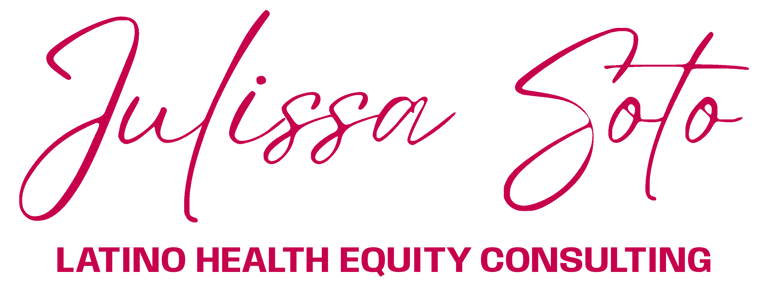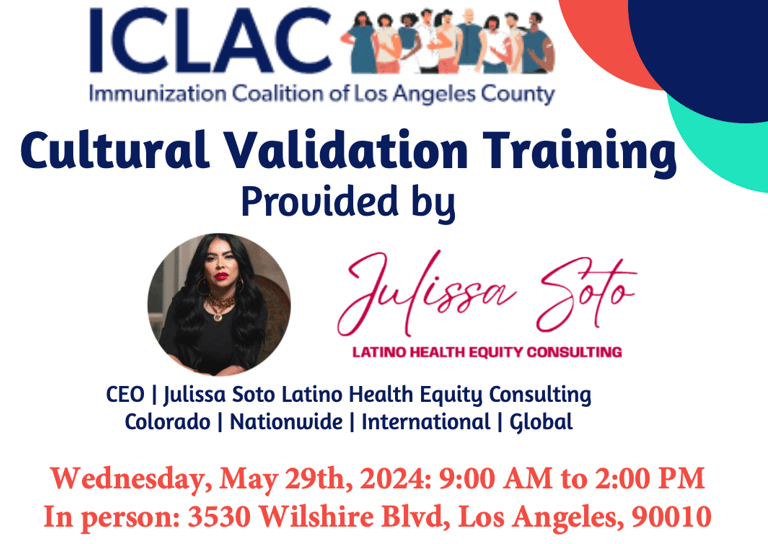Cultural Brokers, Navigators, Promotoras de Salud Training to Address Vaccination Inequities in South Los Angeles
Organized by the Los Angeles County Department of Public Health (LAC DPH) Vaccine Preventable Disease Control Program (VPDCP) in collaboration with the Immunization Coalition of Los Angeles County (ICLAC) and Julissa Soto Latino Health Equity Consulting, this on-site training session aims to address pressing health disparities in vaccination uptake among racial and ethnic minority adults in South LA.
Julissa Soto
5/18/2024
Cultural Brokers, Navigators, Promotoras de Salud Training to Address Vaccination Inequities in South Los Angeles
On May 29, 2024, a pivotal event will take place in South Los Angeles: the Cultural Brokers, Navigators, Promotoras de Salud Training. Organized by the Los Angeles County Department of Public Health (LAC DPH) Vaccine Preventable Disease Control Program (VPDCP) in collaboration with the Immunization Coalition of Los Angeles County (ICLAC) and Julissa Soto Latino Health Equity Consulting, this on-site training session aims to address pressing health disparities in vaccination uptake among racial and ethnic minority adults in South LA.
The Power of Cultural Validation
Julissa Soto, a prominent advocate for Latino health equity, will lead the training under the theme "The Power of Cultural Validation." This initiative seeks to increase vaccination rates and tackle inequities in influenza and COVID-19 vaccination coverage, focusing particularly on Black and Latino adults aged 50 years and older, a demographic disproportionately affected by these diseases.
Addressing Barriers and Enhancing Education
The objectives of the training are clear and crucial:
Understanding Barriers: Participants will delve into the current obstacles preventing COVID-19 and influenza vaccination among adults in local communities. This includes examining the multifaceted issues such as limited access to healthcare, stigma, racism, and historical distrust in government and healthcare systems.
Identifying Inequities: The training will help identify specific vaccine inequities and pinpoint opportunities to enhance vaccine education and access at the local level. By understanding these gaps, efforts can be better targeted to meet the community's needs.
Developing Collaborations: A significant goal is to foster and enhance local collaborations that can improve vaccine education, outreach, and access. These partnerships are vital for creating sustainable changes and improving public health outcomes.
Sharing Knowledge: Participants will contribute to a shared learning environment, reporting challenges, results, and outcomes throughout the project period. This collective approach ensures continuous improvement and adaptation of strategies.
The Context: South Los Angeles' Health Landscape
South LA, home to over 1 million residents, faces severe health disparities. The area has the highest rate of overall poverty in Los Angeles County, with 31% of residents living below the federal poverty line. Education levels are notably low, and the region is classified as a 'health desert' due to the shortage of local healthcare providers.
The COVID-19 pandemic has starkly highlighted these issues. The mortality rate from COVID-19 in South LA stands at 497 per 100,000, significantly higher than the county average of 333 per 100,000. Factors such as limited access to healthcare services, systemic racism, and pervasive health misinformation have exacerbated these disparities.
Bridging Gaps Through Community Empowerment
Given the high levels of poverty, morbidity, and mortality in South LA, this training is not just timely but essential. It acknowledges the critical need for culturally sensitive approaches to healthcare, particularly in communities where English literacy is low and access to reliable health information is limited.
By empowering cultural brokers, navigators, and promotoras de salud, the training aims to create a network of informed and motivated individuals who can bridge these gaps. These community health workers will be equipped to provide accurate health information, combat misinformation, and advocate for better healthcare access for their communities.
JULISSA SOTO LATINO HEALTH EQUITY CONSULTING
Denver, CO.
Copyright © 2024 Julissa Soto Latino Health Equity Consulting

Julissa Soto Latino Health Equity Consulting has a dedicated media department. Members of the press, non profits, companies, businesses and the general public are welcome to contact us...


